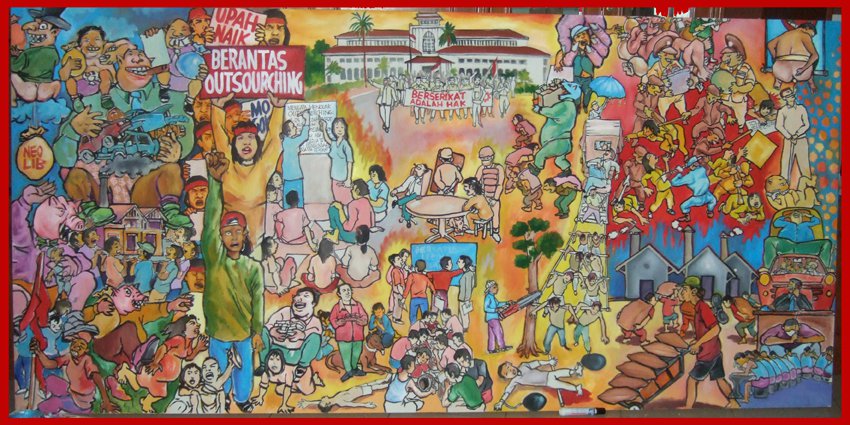Berita Jogja - October 8, 2010
Labour activists from the Workers Challenge Alliance (ABM), the Yogyakarta Labour Alliance (ABY), the Greater Jakarta Labour Federation of Struggle (FBPJ) and the United Indonesian Labour Movement-Security Employees Union (SPK-PPBI) explicitly opposed further labour liberalisation.
This was conveyed during a public discussion titled "The Fate of Workers under Revisions to Law Number 13/2003 and Solutions for the Indonesian Labour Movement", which was held at the Atmajaya University faculty of law conference room in Jakarta on Tuesday afternoon, October 5.
During the discussion, the representatives from the respective labour groups explained their perspectives in relation to proposed revisions to Law Number 13/2003 on Labour. The ABM, ABY, FBPJ and SPK-PPBI are concerned that these revisions will harm workers bearing in mind that the existing labour law already favours investors.
"It is as if the government and investors are still dissatisfied with the [existing] oppression of workers", said ABM member Budi Wardoyo. The existence of work contracts for a specified periods (PKWT) and employment contracting agreements (PPP) in the current labour law have already destroyed workers' job security. Moreover in the planned revisions, the regulations on these matters will further benefit investors.
This includes Article 59 on PKWT that will be liberalised further, Article 65 on PPP, Article 142 on the right to strike that will make things more difficult for workers, and Article 156 that will further reduce severance pay. "This is a new form of slavery" said ABY General Secretary Kirnadi.
John Silaban from the FPBJ's department of organisational development even said that the current labour law is against the 1954 Constitution, specifically Article 27 Paragraph 2. This article states that all citizens have the right to gainful employment and a reasonable livelihood as human beings. Silaban believes that Law Number 13/2003 undermines these rights. Yet the state should be siding with workers whose position is weak because they do not own the means of production.
It is as though the state has relinquished its responsibility by leaving disputes between workers and investors to the Industrial Relations Court (PHI). "The state has now become just an arbiter, yet it is clear that workers are in an unequal position. Even more so when the state sides with investors," said Wardoyo. Wardoyo also believes that the planned revisions to the labor law are a move by the government to facilitate capital investment.
Conversely, PHI judge H. Mohammad Hono Sejati believes that Law Number 13/2003 already favours workers. According to Sejati, the current labour law is faster, more effective and cheaper than previous regulations. On the other hand however, he believes that the law still needs to be revised. "[But] Personally as a human being I also don't agree with labour liberalisation", he said. [Azhar, Gading]
Labour activists from the Workers Challenge Alliance (ABM), the Yogyakarta Labour Alliance (ABY), the Greater Jakarta Labour Federation of Struggle (FBPJ) and the United Indonesian Labour Movement-Security Employees Union (SPK-PPBI) explicitly opposed further labour liberalisation.
This was conveyed during a public discussion titled "The Fate of Workers under Revisions to Law Number 13/2003 and Solutions for the Indonesian Labour Movement", which was held at the Atmajaya University faculty of law conference room in Jakarta on Tuesday afternoon, October 5.
During the discussion, the representatives from the respective labour groups explained their perspectives in relation to proposed revisions to Law Number 13/2003 on Labour. The ABM, ABY, FBPJ and SPK-PPBI are concerned that these revisions will harm workers bearing in mind that the existing labour law already favours investors.
"It is as if the government and investors are still dissatisfied with the [existing] oppression of workers", said ABM member Budi Wardoyo. The existence of work contracts for a specified periods (PKWT) and employment contracting agreements (PPP) in the current labour law have already destroyed workers' job security. Moreover in the planned revisions, the regulations on these matters will further benefit investors.
This includes Article 59 on PKWT that will be liberalised further, Article 65 on PPP, Article 142 on the right to strike that will make things more difficult for workers, and Article 156 that will further reduce severance pay. "This is a new form of slavery" said ABY General Secretary Kirnadi.
John Silaban from the FPBJ's department of organisational development even said that the current labour law is against the 1954 Constitution, specifically Article 27 Paragraph 2. This article states that all citizens have the right to gainful employment and a reasonable livelihood as human beings. Silaban believes that Law Number 13/2003 undermines these rights. Yet the state should be siding with workers whose position is weak because they do not own the means of production.
It is as though the state has relinquished its responsibility by leaving disputes between workers and investors to the Industrial Relations Court (PHI). "The state has now become just an arbiter, yet it is clear that workers are in an unequal position. Even more so when the state sides with investors," said Wardoyo. Wardoyo also believes that the planned revisions to the labor law are a move by the government to facilitate capital investment.
Conversely, PHI judge H. Mohammad Hono Sejati believes that Law Number 13/2003 already favours workers. According to Sejati, the current labour law is faster, more effective and cheaper than previous regulations. On the other hand however, he believes that the law still needs to be revised. "[But] Personally as a human being I also don't agree with labour liberalisation", he said. [Azhar, Gading]
[Translated by James Balowski. The original title of the report was "Workers reject labour liberalisation".]





No comments:
Post a Comment